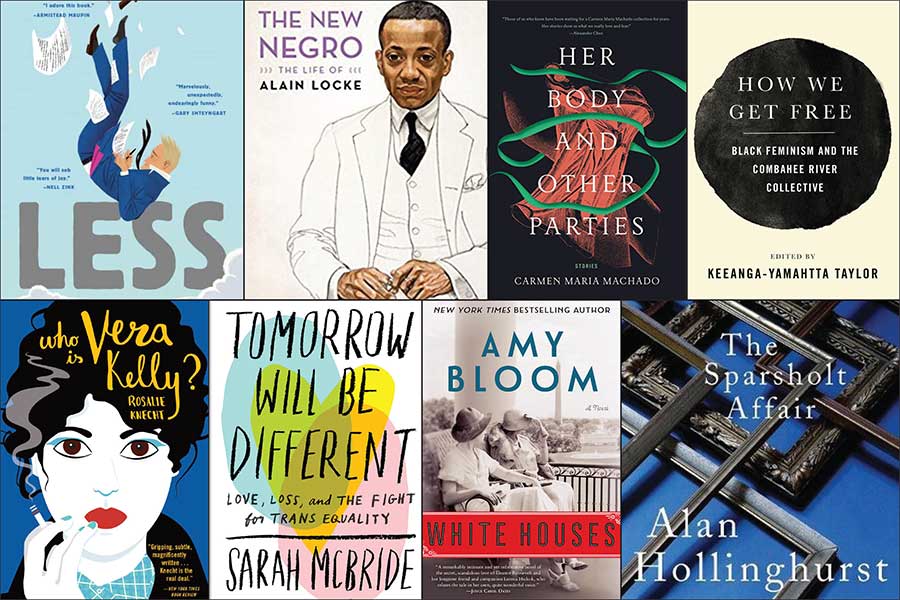There were so many superb LGBTQ books in 2018 that it’s impossible to narrow the field to a “best” list. Americans are reading fewer books, which is disappointing for those of us who write them, so consider including more reading as a New Year’s resolution.
Here are 10 books you won’t want to miss, starting with 2018’s Pulitzer Prize for fiction — awarded to a gay writer for a gay novel.
“Less,” by Andrew Sean Greer, is, by all accounts, a surprise sleeper choice, making the win all the more sweet for the LGBTQ community and the author. The protagonist of this comedic romantic novel, Arthur Less, goes on a literary tour of the world in advance of his 50th birthday. The novel delves into gay relationships, the prospects of aging and the foibles of both. “Less” was also a New York Times bestseller.
This year’s National Book Award winner for nonfiction is Dr. Jeffrey C. Stewart’s extraordinary biography, “The New Negro: The Life of Alain Locke.” The Philadelphia-born Locke was the first black Rhodes Scholar and his life as a black philosopher, educator and father of the Harlem Renaissance was complicated by his gayness, deep loneliness and fear of being outed. Stewart’s master work comprises nearly 1,000 pages. His research took 20 years and includes new details about the lives of Harlem Renaissance stars Zora Neale Hurston and Langston Hughes, among others.
The Lambda Literary Award winner for lesbian fiction — also a finalist for the National Book Award for fiction — is “Her Body and Other Parties, Stories,” by Carmen Maria Machado. It’s a confection of fantasy, science fiction and queerness filled with the truths of women’s lives revealed within the context of the myths about those lives. Deeply, provocatively feminist in an era when that word has increasingly been deemed anathema, Machado’s prose is positively liquid in its evocation and provocation. “I have heard all the stories about girls like me, and I am unafraid to make more of them,” Machado writes in one entry. This is among the best writing of the year.
In “Who Is Vera Kelly?” by Pennsylvania author Rosalie Knecht, a young woman in 1960s Greenwich Village struggles to make the rent and find a place for herself in the underground gay scene. She works night shifts at a radio station, where her technical skills and outspokenness get her noticed by a recruiter for the CIA. One of NPR’s best books of the year, The New York Times called it “gripping, subtle, magnificently written.”
British novelist Alan Hollinghurst is one of the great gay novelists, an inheritor of Evelyn Waugh and Somerset Maugham and author of the iconic “The Swimming Pool Library.” He has won the Booker Prize, the Somerset Maugham Award and the Whitehead Award. “The Sparsholt Affair” is classic Hollinghurst; a sumptuously written love story that begins in 1940 and spans decades. The affair between the son of a famous Oxford novelist and a charismatic engineering student reverberates for decades through three generations of men.
Princeton Professor Keeanga-Yamahtta Taylor’s “How We Get Free: Black Feminism and The Combahee River Collective” won the 2018 Lambda Literary Award for historical nonfiction. This is a newly edited collection of essays and interviews with the founding members of The Combahee River Collective, a path-breaking group of radical black feminists and lesbians that emerged as one of the most important facets of the antiracist and women’s- liberation movements of the 1960s-’70s. It is essential historical reading for the LGBTQ and feminist communities.
Sarah McBride, national press secretary for the Human Rights Campaign, made history in 2016 as the first out trans woman to speak at a major political-party convention when she gave a groundbreaking speech at the Democratic National Convention in Philadelphia. Her 2018 memoir, “Tomorrow Will Be Different: Love, Loss, and the Fight for Trans Equality,” with a foreword by former Vice President Joe Biden, catalogues the 28-year-old Delawarian’s transition and her subsequent activism.
Alexander Chee describes himself as “half Korean, all queer.” His “How to Write an Autobiographical Novel” was named a best book of the year by every major news and literary outlet — and, indeed, this compelling collection of deeply personal essays explains why. Chee delves into his gay life, his boyhood, what led to his becoming a writer, the AIDS crisis and profound personal trauma.
National Book Award finalist Amy Bloom’s “White Houses” is a rich and textured fictional retelling of the lesbian love affair between Eleanor Roosevelt and journalist Lorena Hickok, as told by the woman Roosevelt called “Hick.” Bloom’s account brings to vivid, scintillating life this indelible historical love story, which we have heard about for years.
If you loved the TV series “Pose,” you will love “The House of Impossible Beauties” by Joseph Cassara. This novel follows young trans woman Angel as she navigates the world of 1980s New York City and the drag-ball scene. She and her boyfriend, Hector, hope to start the first Latino House on the ball circuit. But tragedy strikes and Angel must move forward on her own. The story is deeply evocative of the era, and the characters — club kids in Harlem in the ’80s and ’90s — will resonate for anyone who was living through that time and the myriad issues within it, including the terror of the AIDS crisis.

